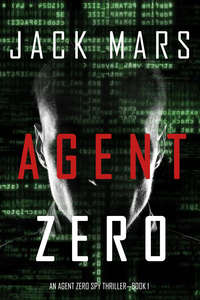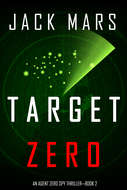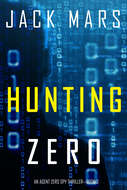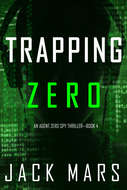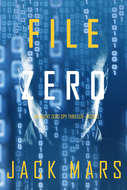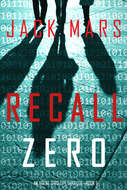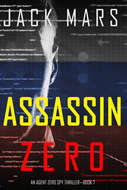Kitabı oku: «Agent Zero», sayfa 2
CHAPTER TWO
Blind. Cold. Rumbling, deafening, jostling, aching.
The first thing Reid noticed as he woke was that the world was black—he could not see. The acrid scent of fuel filled his nostrils. He tried to move his throbbing limbs, but his hands were bound behind him. He was freezing, but there was no breeze; just cold air, as if he were sitting in a refrigerator.
Slowly, as if through a fog, the memory of what had occurred floated back to him. The three Middle Eastern men. A bag over his head. A needle in his arm.
He panicked, yanking at his bonds and flailing his legs. Pain seared through his wrists where the metal of the cuffs dug into his skin. His ankle pulsed, sending shockwaves up his left leg. There was an intense pressure in his ears, and he could not hear anything other than a roaring engine.
For just a split second, he felt a dropping sensation in his stomach—a result of negative vertical acceleration. He was on a plane. And by the sound of it, this was no ordinary passenger plane. The rumbling, the intensely loud engine, the smell of fuel… he realized he must on a cargo plane.
How long had he been unconscious? What did they shoot him with? Were the girls safe? The girls. Tears stung his eyes as he hoped against hope that they were safe, that the police had heard enough of his message, and that authorities had been sent to the house…
He squirmed in his metal seat. Despite the pain and hoarseness in his throat, he ventured to speak.
“H-hello?” It came out as barely a whisper. He cleared his throat and tried again. “Hello? Anyone…?” He realized then that the noise of the engine would drown him out to anyone who wasn’t seated beside him. “Hello!” he tried to shout. “Please… someone tell me what’s—”
A harsh male voice hissed at him in Arabic. Reid flinched; the man was close, no more than a few feet away.
“Please, just tell me what’s going on,” he pleaded. “What’s happening? Why are you doing this?”
Another voiced shouted threateningly in Arabic, this time to his right. Reid winced at the sharp reprimand. He hoped that the rumbling of the plane masked the trembling in his limbs.
“You have the wrong person,” he said. “What is it you want? Money? I don’t have much, but I can—wait!” A strong hand closed around his upper arm in a viselike grip, and an instant later he was ripped from his seat. He staggered, trying to stand, but the unsteadiness of the plane and the pain in his ankle won out. His knees buckled and he fell on his side.
Something solid and heavy struck him in the midsection. Pain spider-webbed through his torso. He tried to protest, but his voice only came out in unintelligible sobs.
Another boot kicked him in the back. Yet another, in the chin.
Despite the horrifying situation, a bizarre thought struck Reid. These men, their voices, these blows all suggested a personal vendetta. He did not just feel attacked. He felt loathed. These men were angry—and their anger was directed at him like the pinpoint of a laser.
The pain subsided, slowly, and gave way to a cold numbness that engulfed his body as he passed out.
*
Pain. Searing, throbbing, aching, burning.
Reid woke again. The memories of the past… he didn’t even know how long it had been, nor did he know if it was day or night, and where he was that it might be day or night. But the memories came again, disjointed, like single frames cut from a film reel and left on the floor.
Three men.
The emergency box.
The van.
The plane.
And now…
Reid dared to open his eyes. It was difficult. The lids felt as if they were glued shut. Even behind the thin skin he could tell that there was a bright, harsh light waiting on the other side. He could feel the heat of it on his face, and see the network of tiny capillaries through his lids.
He squinted. All he could see was the unforgiving light, bright and white and searing into his head. God, his head hurt. He tried to groan and found, through an electric dose of new pain, that his jaw hurt as well. His tongue felt fat and dry, and he tasted a mouthful of pennies. Blood.
His eyes, he realized—they had been difficult to open because they were, in fact, glued shut. The side of his face felt hot and sticky. Blood had run down his forehead and into his eyes, no doubt from being relentlessly kicked to unconsciousness on the plane.
But he could see the light. The bag had been removed from his head. Whether or not that was a good thing remained to be seen.
As his eyes adjusted, he tried again in vain to move his hands. They were still bound, but this time, not by handcuffs. Thick, coarse ropes held him in place. His ankles, too, were lashed to the legs of a wooden chair.
Finally his eyes adjusted to the harshness of the light and hazy outlines formed. He was in a small windowless room with uneven concrete walls. It was hot and humid, enough for sweat to prickle on the back of his neck, though his body felt cold and partially numb.
He could not fully open his right eye and it stung to try. Either he had been kicked there, or his captors had beaten him further while he was unconscious.
The bright light was coming from a thin procedure lamp on a tall, thin wheeled base, adjusted to about his height and shining downward in his face. The halogen bulb shined fiercely. If there was anything behind that lamp, he couldn’t see it.
He flinched as a heavy chink echoed through the small room—the sound of a deadbolt sliding aside. Hinges groaned, but Reid could not see a door. It closed again with a dissonant clang.
A silhouette blocked the light, bathing him in its shadow as it stood over him. He trembled, not daring to look up.
“Who are you?” The voice was male, slightly higher pitched than that of his previous captors, but still heavily tinged with a Middle Eastern accent.
Reid opened his mouth to speak—to tell them he was nothing more than a history professor, that they had the wrong guy—but he quickly recalled that the last time he tried to do so, he was kicked into submission. Instead, a small whimper escaped his lips.
The man sighed and retreated away from the light. Something scraped against the concrete floor; the legs of a chair. The man adjusted the lamp so that it faced slightly away from Reid, and then sat across from him in the chair so that their knees were nearly touching.
Reid slowly looked up. The man was young, thirty at best, with dark skin and a neatly trimmed black beard. He wore round, silver eyeglasses and a white kufi, a brimless, rounded cap.
Hope blossomed within Reid. This young man appeared to be an intellectual, not like the savages who had attacked him and torn him from his home. Perhaps he could negotiate with this man. Perhaps he was in charge…
“We will start simple,” the man said. His voice was soft and casual, the way a psychologist might speak with a patient. “What is your name?”
“L… Lawson.” His voice cracked on his first try. He coughed, and was slightly alarmed to see specks of blood hit the floor. The man before him wrinkled his nose distastefully. “My name is… Reid Lawson.” Why did they keep asking his name? He’d told them already. Did he unwittingly wrong someone?
The man sighed slowly, in and out through his nose. He propped his elbows against his knees and leaned forward, lowering his voice further. “There are many people who would like to be in this room right now. Lucky for you, it is just you and I. However, if you are not honest with me, I will have no choice but to invite… others. And they tend to lack my compassion.” He sat up straight. “So I ask you again. What… is… your… name?”
How could he convince them that he was who he said he was? Reid’s heart rate doubled as a stark realization struck him like a blow to the head. He might very well die in this room. “I’m telling you the truth!” he insisted. Suddenly the words flowed from him like a burst dam. “My name is Reid Lawson. Please, just tell me why I’m here. I don’t know what’s happening. I haven’t done anything—”
The man backhanded Reid across the mouth. His head jerked wildly. He gasped as the sting radiated through his freshly split lip.
“Your name.” The man wiped blood from the gold ring on his hand.
“I t-told you,” he stammered. “M-my name is Lawson.” He choked back a sob. “Please.”
He dared to look up. His interrogator stared back impassively, coldly. “Your name.”
“Reid Lawson!” Reid felt heat rise in his face as the pain congealed into anger. He didn’t know what else to say, what they wanted him to say. “Lawson! It’s Lawson! You can check my… my…” No, they couldn’t check his identification. He didn’t have his wallet on him when the trio of Muslim men took him.
His interrogator tut-tutted, and then drove his bony fist into Reid’s solar plexus. The air was again forced from his lungs. For a full minute, Reid could not draw a breath; it finally came again in a ragged gasp. His chest burned fiercely. Sweat dripped down his cheeks and burned his split lip. His head hung limp, his chin between his collarbones, as he fought off a wave of nausea.
“Your name,” the interrogator repeated calmly.
“I… I don’t know what you want me to tell you,” Reid whispered. “I don’t know what you’re looking for. But it’s not me.” Was he losing his mind? He was certain he hadn’t done anything to deserve this sort of treatment.
The man in the kufi leaned forward again, this time taking Reid’s chin gently with two fingers. He lifted his head, forcing Reid to look him in the eyes. His thin lips stretched into a half smirk.
“My friend,” he said, “this will get much, much worse before it gets better.”
Reid swallowed and tasted copper at the back of his throat. He knew that blood was an emetic; about two cups’ worth would cause him to vomit, and he already felt nauseous and dizzy. “Listen to me,” he implored. His voice sounded tremulous and timid. “The three men that took me, they came to 22 Ivy Lane, my home. My name is Reid Lawson. I am a professor of European history at Columbia University. I am a widower, with two teen…” He stopped himself. So far his captors had not given any indication that they knew about his girls. “If that’s not what you’re looking for, I cannot help you. Please. That’s the truth.”
The interrogator stared for a long, unblinking moment. Then he barked something sharply in Arabic. Reid flinched at the sudden outburst.
The deadbolt slid back again. Over the man’s shoulder, Reid could see just an outline of the thick door as it swung open. It appeared to be made of some kind of metal, iron or steel.
This room, he realized, was built to be a prison cell.
A silhouette appeared in the doorway. The interrogator shouted something else in his native tongue, and the silhouette vanished. He smirked at Reid. “We will see,” he said simply.
There was a telltale squeak of wheels, and the silhouette reappeared, this time pushing a steel cart into the small concrete room. Reid recognized the conveyor as the quiet, hulking brute who had come to his home, still wearing the perpetual scowl.
Upon the cart was an archaic machine, a brown box with a dozen knobs and dials and thick black wires plugged into one side. From the opposite end trailed a scroll of white paper with four thin needles pressed against it.
It was a polygraph machine—probably nearly as old as Reid was, but a lie detector nonetheless. He breathed a sigh of half-relief. At least they would know that he was telling the truth.
What they might do with him afterward… he didn’t want to think about that.
The interrogator set about wrapping the Velcro sensors around two of Reid’s fingers, a cuff around his left bicep, and two cords around his chest. He took a seat again, produced a pencil from his pocket, and stuck the pink eraser end in his mouth.
“You know what this is,” he said simply. “You know how this works. If you say anything other than the answers to my questions, we will hurt you. Do you understand?”
Reid nodded once. “Yes.”
The interrogator flicked a switch and fiddled with the knobs of the machine. The scowling brute stood over his shoulder, blocking the light from the procedure lamp and staring down at Reid.
The thin needles danced slightly against the scroll of white paper, leaving four black trails. The interrogator marked the sheet with a scribble, and then turned his cool gaze back to Reid. “What color is my hat?”
“White,” Reid answered quietly.
“What species are you?”
“Human.” The interrogator was establishing a baseline for the questions to come—usually four or five known truths so that he could monitor for potential lies.
“In what city do you dwell?”
“New York.”
“Where are you now?”
Reid almost scoffed. “In a… in a chair. I don’t know.”
The interrogator made intermittent marks on the paper. “What is your name?”
Reid did his best to keep his voice steady. “Reid. Lawson.”
All three of them were eyeing the machine. The needles continued unperturbed; there were no significant crests or valleys in the scrawling lines.
“What is your occupation?” the interrogator asked.
“I am a professor of European history at Columbia University.”
“How long have you been a university professor?”
“Thirteen years,” Reid answered honestly. “I was an assistant professor for five and an adjunct professor in Virginia for another six. I’ve been an associate professor in New York for the past two years.”
“Have you ever been to Tehran?”
“No.”
“Have you ever been to Zagreb?”
“No!”
“Have you ever been to Madrid?”
“N—yes. Once, about four years ago. I was there for a summit, on behalf of the university.”
The needles remained steady.
“Don’t you see?” As much as Reid wanted to shout, he fought to remain calm. “You have the wrong person. Whoever you’re looking for, it’s not me.”
The interrogator’s nostrils flared, but otherwise there was no reaction. The brute clasped his hands in front of him, his veins standing stark against his skin.
“Have you ever met a man named Sheikh Mustafar?” the interrogator asked.
Reid shook his head. “No.”
“He’s lying!” A tall, lanky man entered the room—one of the other two men who had assaulted his home, the same one who had first asked him his name. He swept in with long strides, his hostile gaze directed at Reid. “This machine can be beaten. We know this.”
“There would be some sign,” the interrogator replied calmly. “Body language, sweat, vitals… Everything here suggests he is telling the truth.” Reid couldn’t help but think they were speaking in English for his benefit.
The tall man turned away and paced the length of the concrete room, muttering angrily in Arabic. “Ask him about Tehran.”
“I did,” the interrogator answered.
The tall man spun on Reid, fuming. Reid held his breath, waiting to be struck again.
Instead, the man resumed his pacing. He said something rapidly in Arabic. The interrogator responded. The brute stared at Reid.
“Please!” he said loudly over their chattering. “I’m not whoever you think I am. I have no memory of anything you’re asking…”
The tall man fell silent, and his eyes widened. He almost smacked himself in the forehead, and then spoke excitedly to the interrogator. The impassive man in the kufi stroked his chin.
“Possible,” he said in English. He stood and took Reid’s head in both his hands.
“What is this? What are you doing?” Reid asked. The man’s fingertips felt slowly up and down his scalp.
“Quiet,” the man said flatly. He probed Reid’s hairline, his neck, his ears—“Ah!” he said sharply. He jabbered to his cohort, who dashed over and violently yanked Reid’s head to one side.
The interrogator ran a finger along Reid’s left mastoid process, the small section of temporal bone just behind the ear. There was an oblong lump beneath the skin, barely larger than a grain of rice.
The interrogator barked something at the tall man, and the latter quickly swept out of the room. Reid’s neck ached from the strange angle at which they were holding his head.
“What? What’s going on?” he asked.
“This lump, here,” the interrogator said, running his finger over it again. “What is this?”
“It’s… it’s just a bone spur,” said Reid. “I’ve had it since a car accident, in my twenties.”
The tall man returned quickly, this time with a plastic tray. He set it down on the cart, next to the polygraph machine. Despite the dim light and the odd angle of his head, Reid could clearly see what was inside the tray. A knot of fear tightened in his stomach.
The tray was home to a number of sharp, silver implements.
“What are those for?” His voice was panicked. He squirmed against his bonds. “What are you doing?”
The interrogator snapped a short command to the brute. He stepped forward, and the sudden brightness of the procedure lamp nearly blinded Reid.
“Wait… wait!” he shouted. “Just tell me what you want to know!”
The brute seized Reid’s head in his large hands and gripped it tightly, forcing him still. The interrogator chose a tool—a thin-bladed scalpel.
“Please don’t… please don’t…” Reid’s breath came in short gasps. He was nearly hyperventilating.
“Shh,” said the interrogator calmly. “You will want to remain still. I would not want to cut off your ear. At least, not by accident.”
Reid screamed as the blade sliced into the skin behind his ear, but the brute held him still. Every muscle in his limbs went taut.
A strange sound reached his ears—a soft melody. The interrogator was singing a tune in Arabic as he cut into Reid’s head.
He dropped the bloody scalpel into the tray as Reid hissed shallow breaths through his teeth. Then the interrogator reached for a pair of needle-nose pliers.
“I’m afraid that was just the beginning,” he whispered in Reid’s ear. “This next part will actually hurt.”
The pliers gripped something in Reid’s head—was it his bone?—and the interrogator tugged. Reid screamed in agony as white-hot pain shot through his brain, pulsing out into nerve endings. His arms trembled. His feet slapped against the floor.
The pain crescendoed until Reid thought he couldn’t possibly take any more. Blood pounded in his ears, and his own screams sounded as if they were far away. Then the procedure lamp dimmed, and the edges of his vision darkened as he slipped into unconsciousness.
CHAPTER THREE
When Reid was twenty-three, he was in a car accident. The stoplight had turned green and he eased into the intersection. A pickup truck jumped the light and smashed into his front passenger side. His head struck the window. He was unconscious for several minutes.
His only injury was a cracked temporal bone in his skull. It healed fine; the only evidence of the accident was a small lump behind his ear. The doctor told him it was a bone spur.
The funny thing about the accident was that while he could recall the event, he couldn’t recall any pain—not when it happened, and not afterward, either.
But he could feel it now. As he regained consciousness, the small patch of bone behind his left ear thrummed torturously. The procedure lamp was again shining in his eyes. He squinted and moaned slightly. Moving his head the slightest amount sent a fresh sting up his neck.
Suddenly his mind flashed onto something. The bright light in his eyes was not the lamp at all.
The afternoon sun blazes against a blue cloudless sky. An A-10 Warthog flies overhead, banking right and dipping in altitude over the flat, drab rooftops of Kandahar.
The vision was not fluid. It came in flashes, like several still photographs in sequence; like watching someone dance under a strobe light.
You stand on the beige rooftop of a partially destroyed building, a third of it blasted away. You bring the stock to your shoulder, eye the scope, and sight in on a man below…
Reid jerked his head and groaned. He was in the concrete room, under the discerning eye of the procedure lamp. His fingers trembled and his limbs felt cold. Sweat trickled down his brow. He was likely going into shock. In his periphery, he could see that the left shoulder of his shirt was soaked in blood.
“Bone spur,” said the interrogator’s placid voice. Then he chuckled sardonically. A slender hand appeared in Reid’s field of vision, gripping the pair of needle-nose pliers. Pinched between its teeth was something tiny and silver, but Reid couldn’t make out details. His vision was fuzzy and the room tilted slightly. “Do you know what this is?”
Reid shook his head slowly.
“I admit, I have only ever seen this once before,” said the interrogator. “A memory suppression chip. It is a very useful tool for people in your unique situation.” He dropped the bloody pliers and the small silver grain into the plastic tray.
“No,” Reid grunted. “Impossible.” The last word came out as little more than a murmur. Memory suppression? That was science fiction. For that to work, it would have to affect the entire limbic system of the brain.
The fifth floor of the Ritz Madrid. You adjust your black tie before you kick in the door with a solid heel just above the doorknob. The man inside is caught off guard; he leaps to his feet and snatches a pistol from the bureau. But before the man can level it at you, you grab his gun hand and twist it down and away. The force snaps the wrist easily…
Reid shook the muddled sequence from his brain as the interrogator took a seat in the chair across from him.
“You did something to me,” he muttered.
“Yes,” the interrogator agreed. “We have liberated you from a mental prison.” He leaned forward with his tight smirk, searching Reid’s eyes for something. “You’re remembering. This is fascinating to watch. You’re confused. Your pupils are abnormally dilated, despite the light. What is real, ‘Professor Lawson’?”
The sheikh. By any means necessary.
“When our memories fail us…”
Last known whereabouts: Safe house in Tehran.
“Who are we?”
A bullet sounds the same in every language… Who said that?
“Who do we become?”
You said that.
Reid felt himself slipping again into the void. The interrogator slapped him twice, jarring him back to the concrete room. “Now we may continue in earnest. So I ask you again. What… is… your… name?”
You enter the interrogation room alone. The suspect is cuffed to a looped bolt in the table. You reach into your inner suit pocket and produce a leather-bound ID badge and open it…
“Reid. Lawson.” His voice was uncertain. “I’m a professor… of European history…”
The interrogator sighed disappointedly. He beckoned with one finger to the brutish, scowling man. A heavy fist plowed into Reid’s cheek. A molar bounced across the floor in a wake of fresh blood.
For a moment, there was no pain; his face was numb, pulsing with the impact. Then a fresh, nebulous agony took over.
“Nnggh…” He tried to form words, but his lips would not move.
“I ask you again,” said the interrogator. “Tehran?”
The sheikh was holed up in a safe house disguised as an abandoned textile factory.
“Zagreb?”
Two Iranian men are apprehended on a private airstrip, about to board a chartered plane to Paris.
“Madrid?”
The Ritz, fifth floor: an activated sleeper cell with a suitcase bomb. Suspected destination: the Plaza de Cibeles.
“Sheikh Mustafar?”
He bargained for his life. Gave us everything he knew. Names, locations, plans. But he only knew so much…
“I know you are remembering,” said the interrogator. “Your eyes betray you… Zero.”
Zero. An image flashed in his head: A man in aviator sunglasses and a dark motorcycle jacket. He stands on the street corner in some European city. Moves with the crowd. No one is aware. No one knows he’s there.
Reid tried again to shake the visions from his head. What was happening to him? The images danced in his head like stop-motion sequences, but he refused to acknowledge them as memories. They were false. Implanted, somehow. He was a university professor, with two teenage girls and a humble home in the Bronx…
“Tell us what you know of our plans,” the interrogator demanded flatly.
We don’t talk. Ever.
The words echoed through the cavern of his mind, over and over. We don’t talk. Ever.
“This is taking too long!” shouted the tall Iranian man. “Coerce him.”
The interrogator sighed. He reached for the metal cart—but not to turn on the polygraph machine. Instead, his fingers lingered over the plastic tray. “I am generally a patient man,” he told Reid. “But I admit, my associate’s frustration is somewhat contagious.” He plucked up the bloody scalpel, the tool he had used to cut the small silver grain from his head, and he gently pressed the tip of the blade against Reid’s denim jeans, about four inches above the knee. “All we want to know is what you know. Names. Dates. Who you’ve told about what you know. The identities of your fellow agents in the field.”
Morris. Reidigger. Johansson. Names flashed across his mind, and with each came a face that he had never seen before. A younger man with dark hair and a cocky smile. A round-faced, friendly-looking guy in a starched white shirt. A woman with flowing blonde hair and steely, gray eyes.
“And what became of the sheikh.”
Somehow Reid was suddenly aware that the sheikh in question had been detained and taken to a black site in Morocco. It wasn’t a vision. He simply knew.
We don’t talk. Ever.
A cold chill ran down Reid’s spine as he struggled to maintain some semblance of sanity.
“Tell me,” the interrogator insisted.
“I don’t know.” The words felt strange rolling from his swollen tongue. He glanced up in alarm and saw the other man smirking back at him.
He had understood the foreign demand… and answered back in flawless Arabic.
The interrogator pushed the tip of the scalpel into Reid’s leg. He screamed as the knife penetrated the muscle of his thigh. He instinctively tried to pull his leg away, but his ankles were bound to the chair legs.
He clenched his teeth hard, his jaw aching in protest. The wound in his leg burned fiercely.
The interrogator smirked and cocked his head slightly. “I will admit, you’re tougher than most, Zero,” he said in English. “Unfortunately for you, I am a professional.” He reached down and slowly tugged off one of Reid’s now-filthy socks. “I don’t get to resort to this tactic often.” He straightened and stared Reid directly in the eye. “Here is what is going to happen next: I am going to cut off small pieces of you, and show you each one. We will begin with your toes. Then the fingers. After that… we will see where we stand.” The interrogator knelt and pressed the blade against the smallest toe of his right foot.
“Wait,” Reid pleaded. “Please, just wait.”
The other two men in the room gathered on either side, watching with interest.
Desperate, Reid fingered the ropes that held his wrists in place. It was an inline knot with two opposing loops tied with half hitches…
An intense shiver ran from the base of his spine to his shoulders. He knew. Somehow he just knew. He had an intense feeling of déjà vu, as if he had been in this situation before—or rather, these insane visions somehow implanted in his head told him he had.
But most importantly, he knew what he had to do.
“I’ll tell you!” Reid panted. “I’ll tell you what you want to know.”
The interrogator glanced up. “Yes? Good. First, however, I am still going to remove this toe. I would not want you to believe that I was bluffing.”
Behind the chair, Reid gripped his left thumb in his opposite hand. He held his breath and jerked hard. He felt the pop as the thumb dislocated. He waited for the sharp, intense pain to come, but it was little more than a dull throb.
A new realization struck him—this was not the first time that had happened to him.
The interrogator sliced into the skin of his toe and he yelped. With his thumb opposite its normal angle, he slipped his hand free of its bonds. With one loop open, the other gave way.
His hands were free. But he had no idea what to do with them.
The interrogator glanced up and his brow furrowed in confusion. “What…?”
Before he could utter another word, Reid’s right hand shot out and grabbed the first implement it closed on—a black-handled precision knife. As the interrogator tried to stand, Reid pulled his hand back. The blade raked across the man’s carotid.
Both hands flew to his throat. Blood eked between his fingers as the wide-eyed interrogator collapsed to the floor.
The hulking brute roared in fury as he lunged forward. He wrapped both meaty hands around Reid’s throat and squeezed. Reid tried to think, but fear gripped him.
Next thing he knew, he lifted the precision knife again and jammed it into the brute’s inner wrist. He twisted his shoulders as he pushed, and opened an avenue up the length of the man’s forearm. The brute screamed and fell, clutching his grievous injury.
The tall, thin man stared in disbelief. Much like before, on the street in front of Reid’s house, he seemed hesitant to approach him. Instead, he fumbled for the plastic tray and a weapon. He grabbed a curved blade and stabbed straight for Reid’s chest.
Reid threw his body weight backward, toppling the chair and narrowly avoiding the knife. At the same time, he forced his legs outward as hard as he could. As the chair hit the concrete, the legs broke off from the frame. Reid stood and nearly stumbled, his legs weak.
The tall man shouted for help in Arabic, and then slashed the air indiscriminately with the knife, back and forth in wide sweeps to keep Reid at bay. Reid kept his distance, watching the silver blade swing hypnotically. The man swept right, and Reid lunged, trapping the arm—and the knife—between their bodies. His momentum drove them forward, and as the Iranian toppled, Reid twisted and neatly sliced through the femoral artery on the back of his thigh. He planted a foot and swished the knife the opposite way, piercing the jugular.
He didn’t know how he knew, but he knew that the man had about forty-seven seconds of life left.
Feet pounded a staircase from nearby. Fingers shaking, Reid dashed to the open doorway and flattened himself against one side. The first thing through was a gun—he immediately identified it as a Beretta 92 FS—and an arm followed, and then a torso. Reid spun, caught the gun in the crook of his elbow, and slid the precision knife sideways between two ribs. The blade pierced the man’s heart. A cry caught on his lips as he slid to the floor.
